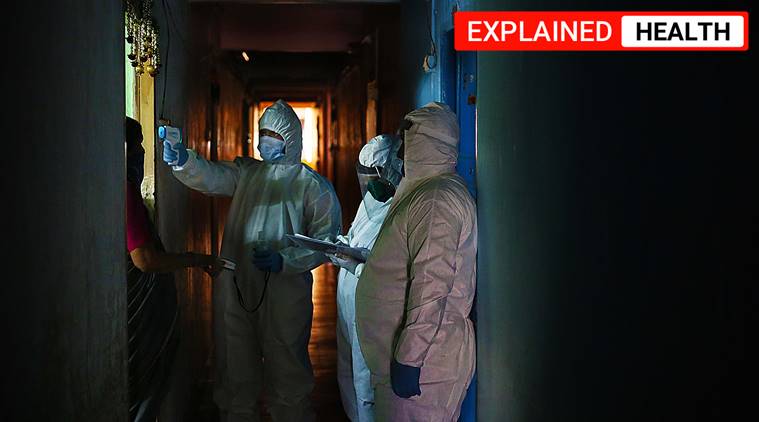Explained: In immune system responses, indicators of Covid severity risk
Researchers examined 113 patients admitted to Yale New Haven Hospital. All patients shared a common Covid-19 “signature” in immune system activity early in the course of disease.
 Coronavirus screening at a residential building in Mumbai on August 3, 2020. (Express Photo: Amit Chakravarty)
Coronavirus screening at a residential building in Mumbai on August 3, 2020. (Express Photo: Amit Chakravarty)
A new study suggests that the differing immune system responses of Covid-19 patients can help predict who will experience moderate and severe consequences of disease. The study, by Yale University researchers, published in journal Nature, suggests that the findings may help identify individuals at high risk of severe illness early.
Researchers examined 113 patients admitted to Yale New Haven Hospital. All patients shared a common Covid-19 “signature” in immune system activity early in the course of disease. Those who experienced only moderate symptoms exhibited diminishing immune system responses and viral load over time. Those who became severe cases showed no decrease in viral load or immune system reaction, and many of the immune signals in these patients accelerated.
Even in the early course of treatment, researchers found indicators that predicted which patients were at greatest risk of developing severe forms of the illness.
“We were able to pull out signatures of disease risk,” senior author Akiko Iwasaki said in a statement released by Yale University.
As is already known, the immune system unleashes damaging “cytokine storm” in severe cases. Researchers said one risk factor was the presence of alpha interferon, a cytokine mobilised to combat viral pathogens such as the flu virus. However, Covid-19 patients with high levels of alpha interferon fared worse than those with low levels.
📣 Express Explained is now on Telegram. Click here to join our channel (@ieexplained) and stay updated with the latest
Another early indicator of poor outcomes is activation of the inflammasome, a complex of proteins that detects pathogens and triggers an inflammatory response to infection. Inflammasome activation was linked to poor outcomes and death in several patients.
The researchers found that people who respond better to the infection tend to express high levels of growth factors — a type of cytokine that repairs tissue damage to the linings of blood vessels and lungs.
Taken together, the data can help predict patients at high risk of poor outcomes, the authors said.
&
(Source: Yale University)
- 01
- 02
- 03
- 04
- 05






































